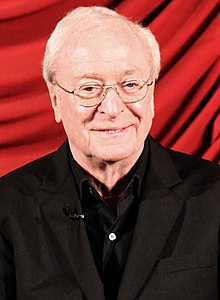
Back Michael Caine ACE Michael Caine AF Michael Caine AN مايكل كين Arabic مايكل كين ARZ Michael Caine AST مایکل کین AZB Майкл Кейн BA Майкл Кейн BE Майкл Кейн BE-X-OLD
Michael Caine | |
|---|---|
 Caine at the 2012 Vienna International Film Festival | |
| Born | Maurice Joseph Micklewhite 14 March 1933 Rotherhithe, London, England |
| Occupation | Actor |
| Years active | 1950–2023 |
| Works | Filmography |
| Political party | Conservative |
| Spouses | |
| Children | 2 |
| Relatives | Stanley Caine (brother) |
| Awards | Full list |
| Military Service | |
| Allegiance | United Kingdom |
| Service | British Army |
| Years of service | 1952–1954 |
| Rank | Private |
| Unit | C Company, 1st Royal Fusiliers |
| Battles / wars | Korean War |
| Awards | Korea Medal UN Korea Medal |
| Website | michaelcaine |
| Signature | |
 | |
Sir Michael Caine (born Maurice Joseph Micklewhite; 14 March 1933) is an English retired actor.[2] Known for his distinctive Cockney accent,[3] he has appeared in more than 160 films over a career that spanned eight decades and is considered a British cultural icon.[4][5] He has received numerous awards including two Academy Awards, a BAFTA Award, three Golden Globe Awards, and a Screen Actors Guild Award. As of 2017, the films in which Caine has appeared have grossed over $7.8 billion worldwide.[6] Caine is one of only five male actors to be nominated for an Academy Award for acting in five different decades.[nb 1] In 2000, he received a BAFTA Fellowship and was knighted by Queen Elizabeth II.
Often playing a Cockney, Caine made his breakthrough in the 1960s with starring roles in British films such as Zulu (1964), The Ipcress File (1965), The Italian Job (1969), and Battle of Britain (1969). During this time he established a distinctive visual style wearing thick horn-rimmed glasses combined with sharp suits and a laconic vocal delivery; he was recognised as a style icon of the 1960s.[7][8][9] He solidified his stardom with roles in Get Carter (1971), The Last Valley (1971), The Man Who Would Be King (1975), The Eagle Has Landed (1976), and A Bridge Too Far (1977).
Caine received two Academy Awards for Best Supporting Actor for his roles as Elliot in Woody Allen's dramedy Hannah and Her Sisters (1986), and as Dr. Wilbur Larch in Lasse Hallström's drama The Cider House Rules (1999). His other Oscar-nominated film roles were in Alfie (1966), Sleuth (1972), Educating Rita (1983), and The Quiet American (2002)—all four of which were for the leading actor category. Other notable performances occurred in the films California Suite (1978), Dressed to Kill (1980), Mona Lisa (1986), Little Voice (1998), Quills (2000), Children of Men (2006), Harry Brown (2009), and Youth (2015).
Caine is also known for his performance as Ebenezer Scrooge in The Muppet Christmas Carol (1992), and for his comedic roles in Dirty Rotten Scoundrels (1988), Miss Congeniality (2000), Austin Powers in Goldmember (2002), and Secondhand Lions (2003). Caine portrayed Alfred Pennyworth in Christopher Nolan's Batman trilogy (2005–2012). He has also had roles in five other Nolan films: The Prestige (2006), Inception (2010), Interstellar (2014), Dunkirk (2017), and Tenet (2020). He announced his retirement from acting in October 2023, with his final film being The Great Escaper, which came out in the same month.
- ^ "Michael Caine". Front Row Interviews. 29 September 2010. BBC Radio 4. Retrieved 18 January 2014.
- ^ McIntosh, Steven (13 October 2023). "Michael Caine confirms retirement from acting after The Great Escaper". BBC News. Retrieved 13 October 2023.
- ^ "Michael Caine's 'Best Sellers' Has Something to Say About the Death of Literacy, If You Can Manage to Stay Awake". Observer. 16 September 2021. Retrieved 20 August 2022.
- ^ O'Connor, Roisin (16 October 2021). "Michael Caine 'not retiring' despite saying Best Sellers was his 'last part'". The Independent. Archived from the original on 12 May 2022. Retrieved 13 November 2021.
- ^ Stephenson, Hannah (18 October 2018). "Sir Michael Caine – story of a British film icon". The Yorkshire Post. Retrieved 13 November 2021.
- ^ "Michael Caine – Box Office Data Movie Star". The-numbers.com. Retrieved 20 March 2014.
- ^ "Classic film of the week: The Ipcress File (1965)". The Times. Retrieved 17 June 2022.
Michael Caine is the epitome of Sixties cool in his first outing as the secret agent Harry Palmer. His cockney smarts, his horn-rimmed glasses
- ^ "Style Heroes: 1960s Michael Caine". The Rake. Retrieved 17 June 2022.
Caine's signature was undoubtedly his thick, horn-rimmed glasses. He wore a number of subtly varying styles throughout the sixties
- ^ "Australian Penthouse – Michael Caine: 1960s". Real Art Press. Retrieved 17 June 2022.
With his no-nonsense, laconic delivery, horn-rimmed glasses and sharply cut suits, he epitomised a new class of British cool. "Michael Caine was the 1960s,"
Cite error: There are <ref group=nb> tags on this page, but the references will not show without a {{reflist|group=nb}} template (see the help page).